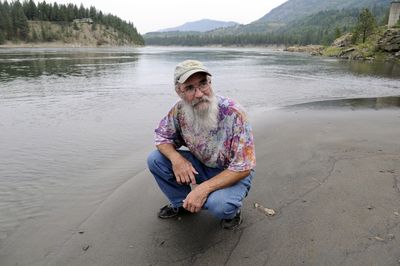Smelter funding beach cleanup
B.C. site dumped metals in river

A Canadian smelter has agreed to clean up a beach near Northport, Wash., that’s become a symbol for a century’s worth of pollution dumped into the Columbia River.
Black Sand Beach takes its name from the slag generated by Teck Resources Ltd.’s smelter in Trail, B.C. A thick deposit of the glassy, granular pollutant covers the popular swimming beach.
Under a voluntary agreement with the state of Washington, Teck Resources will excavate about 5,000 cubic yards of slag from the beach next fall, when the water is low. The slag, a byproduct of the smelting process, contains heavy metals including lead, arsenic and zinc. Through the $1 million cleanup project, the slag will be recycled and sold for use in the cement industry.
Excavating the beach addresses “a small fraction” of the slag in the Columbia River, said John Roland, a supervisor with the Washington Department of Ecology’s toxic cleanup program. Teck Resources, formerly known as Teck Cominco, dumped 400 or more tons of slag into the river daily from the late 1800s until 1995, when the Canadian government put a halt to the practice.
“It’s a starting point,” Roland said of the Black Sand Beach cleanup. However, Citizens for a Clean Columbia – an activist group of about 70 people – said other beaches should take higher priority for cleanup. The group links colitis, Crohn’s disease and other bowel diseases suffered by Northport residents to their use of polluted beaches in the community, which is downriver from the smelter.
Ecology and Teck Resources should test beaches for heavy metals near where clusters of bowel disease were reported and target them for cleanup, said Bob Jackman, whose wife and son frequently swam in the Columbia and later developed colitis.
“Black Sand Beach is the visual image of what Teck Resources has done, but the cleanup is a lot of window dressing,” said Matt Wolohan, another member of Citizens for a Clean Columbia. “I don’t know what Ecology and Teck expect to get out of it. Good PR maybe.”
Ecology’s Roland said Black Sand Beach was selected for several reasons. “It’s well used by the local community for swimming, and it’s on state trust land” about three miles downstream from the U.S.-Canadian border, he said.
Black Sand Beach also contains high levels of zinc and copper, both of which are toxic to aquatic insects, he said. In 2005, the federal Environmental Protection Agency tested 15 beaches in the Upper Columbia River for pesticides and heavy metals, determining that they were safe for recreational use of two weeks a year. This summer, the EPA started additional testing that will determine if people and animals are at risk from the pollution. The results will drive future cleanup work. The EPA’s work is separate from Black Sand Beach’s cleanup, which is directed by the state, Roland said.
During the last legislative session, Ecology secured $2 million in state funds to do the cleanup at Black Sand Beach. When Teck Resources learned about the project, the company offered to pay for the work. Because Teck will recycle the slag, the cleanup costs were cut by about half, Roland said.
“We saw this as an opportunity to work cooperatively with the state … to get something done that everyone felt should be done,” said David Godlewski, a vice president at Teck American, the company’s U.S. subsidiary in Spokane.
“We think that it will lower some of the concerns that people have about the river.”